olivia
Goodreads expatriate seeking a new online book community. I'm currently testing BookLikes to see if it could be home.
A Handful of Dust (Everyman's Library)

I studied A Handful of Dust for my book club. While I recognize its merit as an example of Juvenalian satire, I really didn't enjoy it. I got Waugh's pointed, cynical mockery, but found it dismal and unpleasant. I understand that this is entirely deliberate on the part of the author. However, if asked if I'd recommend it to anyone, my answer would be no. I enjoyed Brideshead Revisited a thousand times more than this novel.
About the only thing this book made me feel was revulsion, particularly for Brenda Last. What a true villain of pedestrian mundanity she is: a self-absorbed survivor whose evil seems magnified by being so commonplace. People like Brenda Last are a dime a dozen.
This work is as ugly and sharp as a stone knife, and almost every character in it bleeds. I recognize its literary credentials, but really didn't care for it.
The Enchanted April

I had wholly inaccurate expectations of this book when I began it, and, thus, never expected to consider it one of the most enjoyable reads I've had in some time. What a wonderful story, full of wise insights about the internal workings of the human mind. Each character perspective is clearly articulated and defined, and written in such a way that I found myself easily connecting with each of the primary voices.
It's a warm and wonderful tale ... predictable and idealized, yes, but predictable and idealized in the way one wants it to be. I wanted positive outcomes and happiness for these people. It also includes a surprising amount of gentle wit.
It's rare that I give anything five stars, but this was exactly what I needed to read at the right time. I've just been through some personal grief, and this mental escape to San Salvatore did me good, much as it did for Lotty, Rose, Mrs. Fisher, and Caroline.
Right Ho, Jeeves
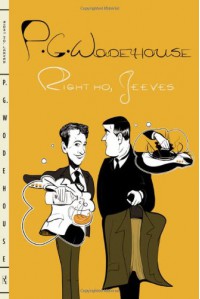
I didn't think this one was quite as entertaining as My Man Jeeves. I preferred the short story format of the first book, which seemed to encourage tighter storytelling.
Dead Reckoning (Sookie Stackhouse, Book 11)
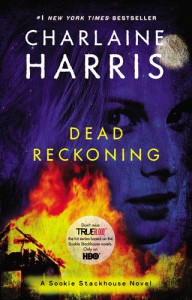
This book seems to set up several things that will likely be factors in the resolution of Sookie Stackhouse's story. It felt exposition-heavy in several places. I'm still charmed by Harris' wonderful attention to regional details, like cheese straws for a baby shower and the kind of punch that was served, but the book ended so abruptly that I felt very frustrated. I feel sure the next one will be better.
Dead And Gone (Sookie Stackhouse, Book 9)

Possibly the most intense book in the series that I've read thus far. I don't want to say more because I don't want to spoil anything.
All Together Dead (Sookie Stackhouse, Book 7)
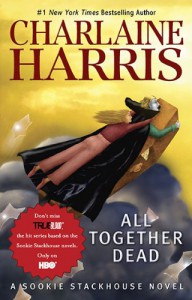
My primary issue with this book relates to the climax, so I can't say much about it without spoiling. I think perhaps that Ms. Harris was indulging in some wishful thinking regarding disasters that were recent at the time the book was written, and I'll just leave it at that.
Definitely Dead (Sookie Stackhouse, Book 6)

I found Definitely Dead to be a significant improvement over the previous book in the series, Dead As a Doornail. I also took an instant liking to Amelia Broadway, a new character Sookie meets during her adventures in New Orleans. It tied up a few loose ends and set the stage for some new associations in the next book (I know that sounds blandly vague, but I'm trying to keep this spoiler-free).
Dead as a Doornail (Sookie Stackhouse, Book 5)
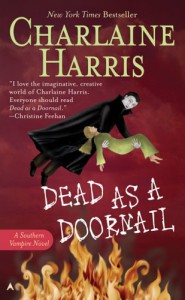
I found this entry in the Sookie Stackhouse series to be disappointing compared to the others. It was obvious to me who the villains were from the outset, so the intended reveal fell flat.
Also, after reaching the end, I definitely don't like Calvin Norris or Alcide Herveaux as much as I did. I suppose Harris is doing that intentionally, to remind us that getting involved with supernatural beings always involves complications, but the stuff with Alcide felt forced to me -- it felt like he was a different character than he'd been in previous books.
I hope the next one is better.
Dead to the World (Sookie Stackhouse, Book 4)

Definitely the most enjoyable in the series so far. I don't want to spoil, but I appreciate the way Harris has played out some details in the arc from book to book. There were a few good, "Ohhhh ... that's why," moments in this one.
Club Dead (Sookie Stackhouse, Book 3)

So, these books are kind of like potato chips: they may be lacking in nutritional value, but they're tasty enough that it's hard to consume just one. :)Also, I think I'm developing a lit crush on Alcide Herveaux. Based on what I've seen so far, he's a much better match for Sookie than either Bill or Eric, who are acting like little boys in a turf war on a playground.And again, I'm enjoying Harris' authenticity. I love the truth of the details about Sookie cleaning her grandmother's cast iron skillet, and the sort of gravel used to pave her driveway. I like the way she's added a supernatural layer to the real world.
Ulysses it ain't, but, then, not every book has to be.
Living Dead in Dallas (Sookie Stackhouse, Book 2)
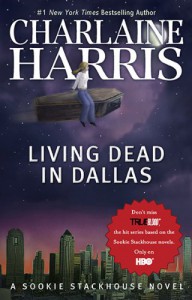
This book put me in a better mood after a rather bad day: I laughed out loud over at least one part near the end. Think pink. :)
Dead Until Dark (Sookie Stackhouse, Book 1)

I picked this book up because I'm on deadline, and I didn't want a novel that would distract me from that priority. I wanted to have something going, but it had to be light and fluffy - something I could put down easily.
Since I've watched the television show, I figured this would be just the ticket.
I was wrong.
There are actually quite a few differences between the book and the television show, and the unanticipated changes made this a real page-turner. To my dismay, I encountered some computer problems this afternoon with my work computer (a CHKDSK and a defrag fixed the problem), but the silver lining was that while I waited for the defragmentation to complete, I polished this off.
I kept thinking that perhaps I was giving the book too much credit and unconsciously filling in details from the show, but no: Harris loads the book with atmospheric descriptions, from the state of the gravel on Bill's driveway to an outfit that's too dressy for work but not quite nice enough for church.
Despite telling a fairly simple story, Harris provides a certain authenticity by inserting little colloquialisms that reflect the South. I also liked the fact that she didn't take herself so seriously. No emo sparkling vampires here: only a writer with a sense of humor would've added Bubba to her narrative. :) (Don't go looking Bubba up on the 'net if you haven't read the book - you'll spoil yourself.)
I was also pleasantly surprised to find that the book wasn't quite as trashy as the show in terms of gratuitous sex. All that Nakey Jason stuff that happens during the first season of True Blood? It isn't in there. At least, not directly (it's alluded to near the end of the book, but it's just mentioned - we don't witness the scenes). HBO used their cable status to spice things up, I guess.
Don't get me wrong: there's still a little bit of a Harlequin Vampire Romance going on here and there, and I don't think many contemporary lit classes are going to be studying these any time soon. Nevertheless, the tone is fun and even peppy at times, and I have to admit that the book, though light, was better than I'd expected it to be. It's a good candidate for an entertaining beach read.
I'll likely read the next one ... sometime after I finish my deadline project, now that my computer is working again. :)
Water for Elephants: A Novel
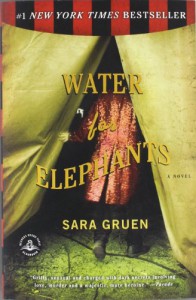
Pros: Reveals entertaining and often surprising details about Depression-era circus culture; animals being treated as integral parts of the plot provides a certain warmth.
Cons: Characters other than the protagonist are mostly two-dimensional; some may find the ending implausible.
I still miss HBO's Carnivale, so it was nice to return to 1930s circus life for a little while. Unfortunately, I didn't find most of the characters in Water for Elephants to be quite as engaging as the show's ensemble.
I felt sympathy for young Jacob's misfortune, and compassion for old Jacob's situation: I cared about him, and about Rosie and Walter, too. It's Marlena, August, and Uncle Al who seemed to exist primarily as plot devices, rather than as fully-realized people.
I was also disappointed by the way a character's exit was handled. I won't spoil by naming names, but he departs the story, and Jacob hardly seems to notice. Our narrator's reaction seemed less than credible, in my opinion.
Overall, it's a light read that I enjoyed more for the snippets of history about the time period than the story itself.
Grade: B-
Fahrenheit 451: A Novel

Fahrenheit 451 was first published in 1953. As we've moved through compact discs and Walkmans, MP3s and iPods, living room-sized television sets and computers that fit in our hands, I wonder if Ray Bradbury, in his early 90s at the time of this writing, feels that we've drawn closer and closer to his dystopian future. To me, this work seems much more relevant today than when he wrote it.
Recommended.
East of Eden
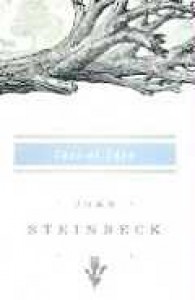
I liked East of Eden. I was surprised by the fact that some of the commentary in it seemed as if it could have been written last week.
The reason I'm giving it four stars rather than five is because it had two aspects that bugged me. Characters that exist almost solely to be the voice of the author irk me and always have (I remember vividly my first encounter with this in Hawthorne's Scarlet Letter). I also found Abra's character a little flat. They kept praising her as a good person, but I didn't really see anything particularly virtuous about her. Also, there is nothing subtle at all about the symbolism, and Steinbeck makes no apologies for that. As a professor friend of mine said, he feels this book is a good introduction to symbolism for those who've never studied it before, because it's almost impossible to miss.
Despite those minor drawbacks, I enjoyed the novel. It's well worth reading if only to acquaint oneself with a classic from one of America's most noted authors. I found Chapter 46 especially relevant: although it has little to do with the book's overall themes, Steinbeck's German could easily be our Muslim today. East of Eden was published in 1952, almost 60 years ago at the time of this writing, and, depressingly, it seems we haven't changed a bit in certain ways. The old adage about those who cannot remember the past being condemned to repeat it comes to mind.
I need a little more time to ruminate and to let it sink in before I make any firm conclusions.
The Adventure of the Priory School
A nice, quick listen (I had the audiobook); a typical Sherlock Holmes story.




